Project News
2021-02-21
Online Training for Intermediate Care
A two-day online training for intermediate care was held on February 17 and 18, 2021. The S-TOP project has an agreement with the Thai government to conduct training in Japan twice a year, but due to the global spread of COVID-19, it has not been possible to conduct any training in Japan since January 2020. As an alternative to this, online training was planned and held with the support of the Thai government.
This training was conducted with a focus on intermediate care, which requires strengthening for elderly care in Thailand to achieve the project purpose "Toward the nationwide expansion, community-based models are developed for the seamless provision of medical, rehabilitative, social and life-support services for elderly person".
The training was conducted for 32 participants from the central ministries (MOPH, MSDHS, NHSO[1]), the pilot sites for developing a model of community-based comprehensive care services and the potential site, which was set up as a place with the potential to conduct similar activities as the pilot site in the future. In addition, there were 48 online observers from Japan and Thailand.
On the first day, Dr. Akinori Hamamura of Kokura Rehabilitation Hospital, Fukuoka, Japan gave a lecture on "Intermediate care development, practices future in Japan". This is very relevant in Thailand now where intermediate care initiatives are just beginning. In his lecture, Dr Hamamura explained the history of intermediate care in Japan, which started as an initiative in the 1970s as it did not exist in the Japanese system at that time, and eventually developed into a national system. After the lecture, a participant asked what should be done to make up for the shortage of human resources for rehabilitation, which is one of the issues for the development of intermediate care in Thailand. In response to this question, Dr. Hamamura explained the history and background of how the shortage of human resources was improved in Japan, and explained that it had taken a long time for the shortage to be resolved in Japan.
On the second day, Ms. Akasaka, an occupational therapist, Ms. Imai, a nurse, and Mr. Oki, a medical social worker from Kaikoukai Rehabilitation Hospital, Aichi, Japan, gave lectures on the practice of rehabilitation during the recovery phase in Japan, with a focus on the team approach. This was followed by a lecture on how Japanese intermediate care system can be applied in Thailand. In particular, Dr. Piyanuk Samewong of Chonburi Hospital (Chonburi province in Thailand), who had previously participated in the training program in Japan, gave a lecture on practical application in Thailand. After this, Mr. Yoichi Maruyama, a physiotherapist from Kakeyu Hospital, Nagano, Japan, who is engaged in the JICA partnership program in Saen Suk, Chonburi Province, gave a lecture on how Japanese care for the elderly can be applied in Thailand, based on their practical experiences in the field. After the lecture, questions were raised about how hospitals and patients pay for rehabilitation in Japan, and how to get the families of patients to understand the needs for rehabilitation and to actively cooperate. To answer these questions, the lecturers explained in detail that in Japan, the cost is covered by medical insurance, long-term care insurance and co-payment, and that education is provided to the patient's family by multidisciplinary team; but continuous interaction is needed to gain the family's understanding.
In the training feedback, all participants answered "satisfied" or "very satisfied" with the training[2], saying that content of the training was very useful and relevant to their jobs. There was a comment that "It was challenging to keep concentration with full day of online participation". However, on the other hand, there were many positive comments such as "I was able to learn about intermediate care in Japan" and "I was able to learn about the actual team approach in the implementation of intermediate care, and I would like to utilize the knowledge gained in this training in my own practice". Based on this feedback from participants, we would like to prepare for the next training to be even better.
Notes
- [1] MOPH: Ministry of Public Health, MSDHS: Ministry of Social Development and Human Security, NHSO: National Health Security Office
- [2] 4 & 5 on scale of 1 to 5
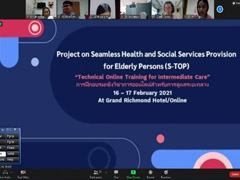
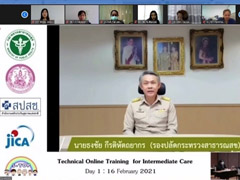
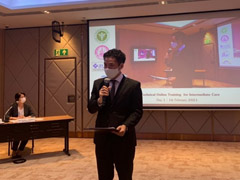
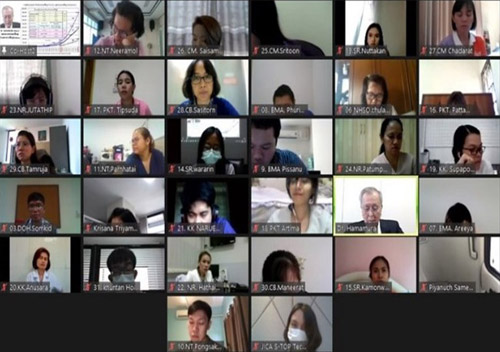
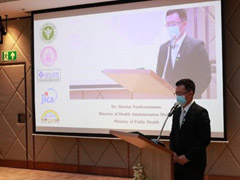
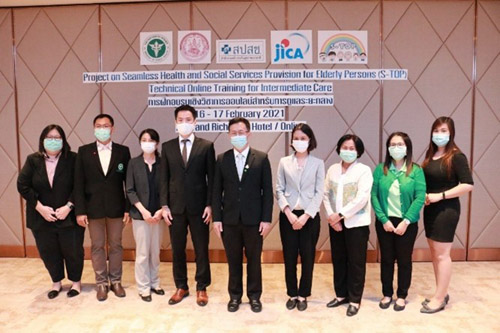
- About JICA
- News & Features
- Countries & Regions
- Our Work
- Thematic Issues
- Types of Assistance
- Partnerships with Other Development Partners
- Climate Change / Environmental and Social Considerations
- Evaluations
- Compliance and Anti-corruption
- Science and Technology Cooperation on Global Issues
- Research
- JICA Development Studies Program / JICA Chair
- Support for the Acceptance of Foreign HRs / Multicultural and Inclusive Community
- Publications
- Investor Relations
